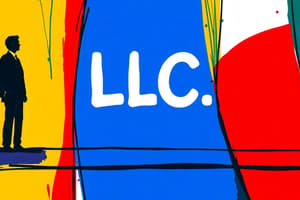Podcast
Questions and Answers
Which business organization is owned and run by one person with complete control?
Which business organization is owned and run by one person with complete control?
- Corporation
- Partnership
- Limited Liability Company
- Sole Proprietorship (correct)
What is a key advantage of a Limited Liability Company (LLC)?
What is a key advantage of a Limited Liability Company (LLC)?
- Stricter regulatory requirements
- Personal liability for all debts
- Limited liability for owners (correct)
- Complete control by one owner
In a general partnership, how is liability structured among partners?
In a general partnership, how is liability structured among partners?
- Limited only to investment amounts
- No liability exists for partners
- Only one partner is liable
- Shared equally among all partners (correct)
Which business structure is characterized by separate legal entities from their owners?
Which business structure is characterized by separate legal entities from their owners?
What factor is a crucial consideration for business owners regarding taxation?
What factor is a crucial consideration for business owners regarding taxation?
How does ownership affect a business organization?
How does ownership affect a business organization?
Which business structure allows for pass-through taxation?
Which business structure allows for pass-through taxation?
What is an important consideration for raising capital in a business structure?
What is an important consideration for raising capital in a business structure?
What factor should a business evaluate regarding owners' control in choosing a business structure?
What factor should a business evaluate regarding owners' control in choosing a business structure?
Which growth strategy involves combining with or acquiring other businesses?
Which growth strategy involves combining with or acquiring other businesses?
What is a key consideration when evaluating international expansion for a business?
What is a key consideration when evaluating international expansion for a business?
What is essential for safeguarding a business's unique aspects from competitors?
What is essential for safeguarding a business's unique aspects from competitors?
Which of the following describes evaluating potential alliances with other businesses?
Which of the following describes evaluating potential alliances with other businesses?
What must a business obtain from government entities to operate legally?
What must a business obtain from government entities to operate legally?
What aspect of business operation may involve careful assessment and could lead to relinquishing control?
What aspect of business operation may involve careful assessment and could lead to relinquishing control?
Why is compliance considered a crucial factor for businesses?
Why is compliance considered a crucial factor for businesses?
Flashcards
Sole Proprietorship
Sole Proprietorship
A business owned and run by one person. The owner has complete control but is personally liable for all business debts.
Partnership
Partnership
A business owned and run by two or more people. Partners share profits, losses, and management responsibilities. Can be general (equal liability) or limited (limited liability for some partners).
LLC (Limited Liability Company)
LLC (Limited Liability Company)
A hybrid business structure combining limited liability of a corporation with pass-through taxation. Owners (members) are generally not personally liable for business debts.
Corporation
Corporation
Signup and view all the flashcards
Ownership (Business)
Ownership (Business)
Signup and view all the flashcards
Liability (Business)
Liability (Business)
Signup and view all the flashcards
Taxation (Business)
Taxation (Business)
Signup and view all the flashcards
Management (Business)
Management (Business)
Signup and view all the flashcards
Lifespan (Business)
Lifespan (Business)
Signup and view all the flashcards
Raising Capital
Raising Capital
Signup and view all the flashcards
Liability Protection
Liability Protection
Signup and view all the flashcards
Business Structure Complexity
Business Structure Complexity
Signup and view all the flashcards
Business Structure Control
Business Structure Control
Signup and view all the flashcards
Capital Needs
Capital Needs
Signup and view all the flashcards
Business Regulations
Business Regulations
Signup and view all the flashcards
Mergers & Acquisitions (M&A)
Mergers & Acquisitions (M&A)
Signup and view all the flashcards
Strategic Partnerships
Strategic Partnerships
Signup and view all the flashcards
International Expansion
International Expansion
Signup and view all the flashcards
Franchising
Franchising
Signup and view all the flashcards
Internal Growth
Internal Growth
Signup and view all the flashcards
Business Licenses & Permits
Business Licenses & Permits
Signup and view all the flashcards
Contracts
Contracts
Signup and view all the flashcards
Intellectual Property
Intellectual Property
Signup and view all the flashcards
Study Notes
Types of Business Organizations
-
Sole Proprietorship: A business owned and run by one person. The owner has complete control but is personally liable for all business debts. Simplicity and ease of setup are key advantages.
-
Partnership: A business owned and run by two or more people. Partners share in the profits and losses, and also the management responsibilities. Partnerships can be general (equal liability) or limited (limited liability for some partners). Like sole proprietorships, partners are typically personally liable for business debts if they are general partners.
-
Limited Liability Company (LLC): A hybrid business structure combining the limited liability of a corporation with the pass-through taxation of a partnership or sole proprietorship. Owners (members) are generally not personally liable for business debts. It often offers more flexibility than corporations.
-
Corporation: A more complex business structure. Corporations are separate legal entities from their owners (shareholders). Shareholders have limited liability, meaning their personal assets are protected from business debts. Corporations face more stringent regulatory requirements and are subject to corporate income tax.
Key Characteristics of Business Organizations
- Ownership: Who owns the business and what are their rights? This defines decision-making power and liability.
- Liability: To what extent are owners personally responsible for business debts? This is a crucial factor in risk assessment.
- Taxation: How are profits taxed? Is it at the business level or passed through to owners? Tax implications are a major consideration for business owners.
- Management: How is the business managed? This involves decision-making power, structure, and accountability. This also defines responsibilities, and delegation of tasks, and decision making.
- Lifespan: How long is the business expected to operate?
- Raising Capital: How easy is it to raise capital for the business? This addresses expansion, potential investments, and the business operation.
Factors to Consider When Choosing a Business Structure
- Liability: Personal liability protection is a critical consideration, especially for significant risk.
- Taxation: Understanding tax implications is crucial, considering factors like income tax rates, and tax deductions. Business owners should consider the structure which offers the most favorable tax strategies.
- Complexity: Ease of setup and ongoing operation, such as legal requirements and record-keeping should be evaluated.
- Control: How much control do owners want or need? Some structures, like sole proprietorships, grant complete control. Others, like corporations, may entail delegated management.
- Capital Needs: The requirement to raise capital differs significantly between each structure. The business owner should evaluate their current funds, and capital requirement in their business plan.
- Regulations: Legal restrictions and reporting requirements vary widely by nature of the business, and the structure chosen.
Growth and Expansion Strategies
- Mergers and Acquisitions (M&A): Combining with or acquiring other businesses to expand market share or operations. A vital consideration includes the legal procedures necessary for this.
- Strategic Partnerships: Collaborating with other businesses to access new markets or resources. Evaluating potential strategic partnerships is vital to success.
- International Expansion: Entering new markets overseas. Considerations include local regulations, cultural differences, and competition. International expansion may require substantial capital, and risk evaluation.
- Franchising: Licensing a business model to others to operate under a specific brand name. Franchising may be an easier and faster strategy, however, requires careful assessment due to the level of control relinquished to the franchisee.
- Internal Growth: Expanding operations within the company through investment in new technologies and processes. Internal growth strategies should consider the current resources and capabilities available to execute the expansion.
Legal and Regulatory Considerations
- Business Licenses and Permits: Obtaining necessary licenses and permits from local, state, and federal governments is crucial. This can include permitting for special regulations due to business type and location.
- Contracts: Defining legal agreements with customers, suppliers, and employees. Understanding the contract terms is essential for all kinds of business transactions.
- Intellectual Property: Protecting trademarks, patents, and copyrights to safeguard the business's unique aspects. Intellectual property protection is essential to ensure business rights, especially when engaging in new products development and expansion.
- Compliance: Adhering to all applicable laws and regulations relevant to the business. This ensures smooth operation by preventing penalties, legal ramifications, and fines.
- Employment Law: Complying with labor laws and regulations for employees and contractors. This can include recruitment, compensation, benefits, termination, etc., and must be aligned with the specific jurisdiction.
Studying That Suits You
Use AI to generate personalized quizzes and flashcards to suit your learning preferences.




